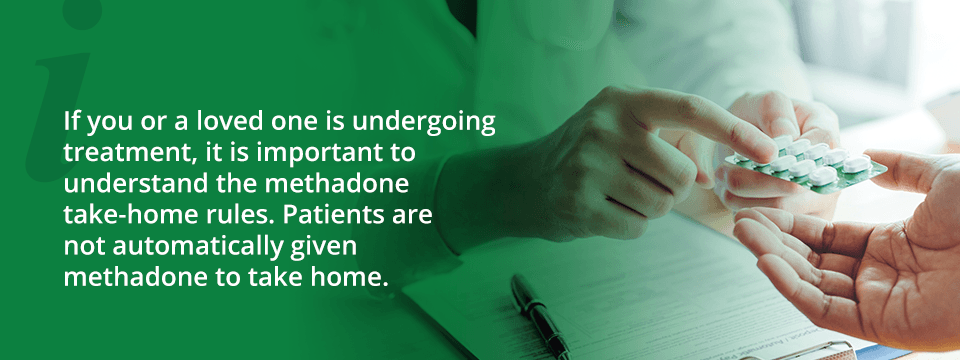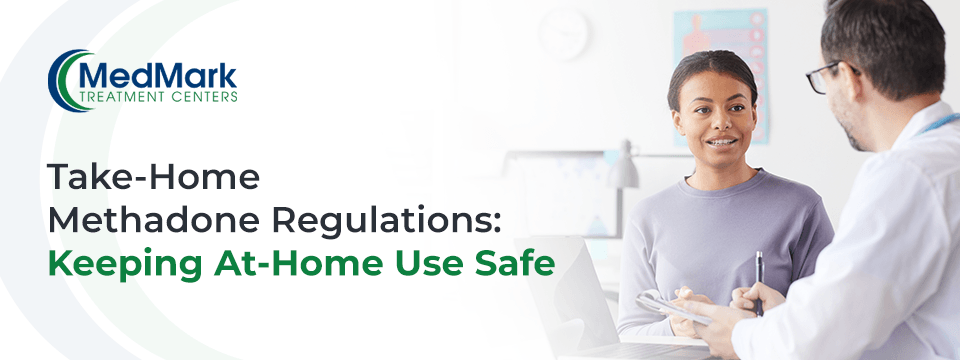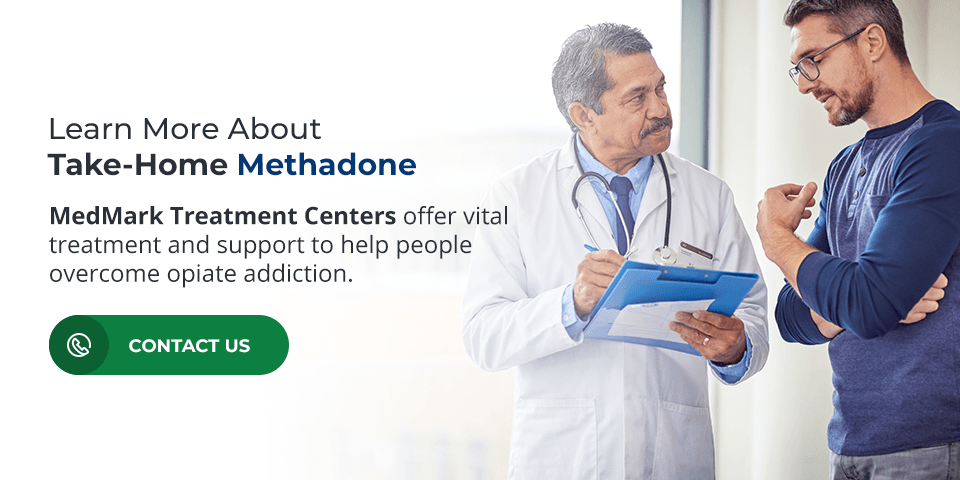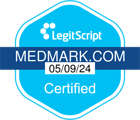When detoxing from drugs such as heroin and opioids, you can experience serious withdrawal symptoms and may be at risk for relapsing. With help and guidance from a treatment center and your doctor, you may be prescribed methadone to help manage the symptoms of withdrawal during your recovery process.
Methadone is an opioid agonist. It affects the same areas of the brain as an opioid, but the effect is much slower. It helps to manage the symptoms of withdrawal without creating the euphoric feeling associated with opioids. Methadone is often administered in controlled, in-person healthcare settings, but some people are able to exercise take-home privileges. Learn more about how take-home methadone is regulated and how the COVID-19 pandemic is affecting take-home medications.

What Are the Regulations for At-Home Methadone Treatment Privileges?
Opioid treatment programs are subject to federal guidelines, as well as state regulations. It is possible for opioid treatment program patients to be approved for unsupervised, at-home use of medications, like methadone. For example, patients may receive a single take-home dose on a day, such as a holiday or weekend, that the treatment clinic is closed.
Beyond single doses for specified circumstances, treatment center medical directors will evaluate different criteria to determine if a patient is ready to take methadone at home. Take-home criteria include requirements such as:
- Regular clinic attendance
- No recent drug or alcohol abuse
- No criminal behavior
- Ability to store medication safely at home
Physicians at the treatment center will also take into consideration how long a patient has been in treatment and the stability of the patient’s home life. Patients in short-term or interim maintenance treatment programs are typically not eligible for take-home methadone. Take-home privileges are generally reserved for patients who are undergoing care in a comprehensive maintenance treatment program.
Medical professionals will carefully weigh the benefits and risks of allowing the patient the responsibility of at-home medication administration as it relates to their recovery progress. The clinic also needs to maintain strict protocols to mitigate the risk of drug diversion, or inappropriate use of prescribed medications like methadone. If opioid treatment program physicians want to deviate in any way from state and federal regulations for take-home methadone, they must obtain an exception.
If you or a loved one is undergoing treatment, it is important to understand the methadone take-home rules. Patients are not automatically given methadone to take home. This is a privilege that is earned over time. You will need to:
- Work closely with your physician: Your physician will ultimately decide whether or not you are ready for take-home methadone. This means your physician needs to be certain you meet the take-home criteria. Open and honest communication with your physician is an important first step in establishing take-home privileges.
- Demonstrate the ability for responsible use: Methadone is a controlled substance. It can be an important part of recovery from opioid dependence, but it can be dangerous if misused or taken by someone who does not have a prescription for it. Your treatment center will most likely require you to transport and store your methadone dosages in a secure lockbox. This helps to ensure the medication is not misplaced between the clinic and your home. This also helps reduce the risk of someone taking the medication at your home, whether accidentally or intentionally.
- Commit to getting better: Finally, it is important to understand that take-home methadone is a privilege that is not granted to everyone. Your physician will want to see that you are fully committed to your treatment plan and to reaching recovery before discussing the possibility of take-home methadone.
How Has the Pandemic Impacted Take-Home Medications?
The COVID-19 pandemic has radically altered our way of life. Large gatherings of people are severely restricted out of necessity, and we have needed to adopt safety measures like social distancing and masks. In this new environment, questions about how to approach take-home medications, including methadone, have arisen.
More than 350,000 people in the United States receive prescription methadone. Treatment clinics help many of these patients on a daily basis. In times before the pandemic, waiting in line to receive a daily dose of medication was common. Now, people gathering in close proximity to one another increases the risk of contracting a highly contagious virus. The federal government and some states have taken a revised approach to take-home rules in the context of the pandemic.
For example, the federal government’s Substance Abuse and Mental Health Services Administration (SAMHSA) has released updated opioid treatment program guidance. Under these new guidelines, opioid treatment programs in all states are able to request take-home medication exceptions for stable patients. This would allow a patient 28 days of take-home doses. Additionally, this guidance allows for exception requests for patients who are less stable. In this case, a patient may be able to receive 14 days of take-home medication doses.
On a more local level, several states are looking at what the pandemic means for people who are undergoing treatment for opioid use disorder. In response to the updated federal guidelines, Pennsylvania has allowed for up to 28-day take-home doses. In Indiana, the state’s Division of Mental Health and Addiction is delivering lockboxes of methadone to help patients recover, reducing the need to make in-person clinic visits.
Do All Methadone Clinics Offer Take-Home Medication?
Opioid treatment programs that offer in-person methadone treatment will likely allow qualifying patients to opt into a take-home process. But, the treatment clinic is not the most important determining factor when it comes to take-home methadone. Your doctor will make the decision whether or not to incorporate take-home methadone into your treatment plan based on your progress. Talk to your doctor. Ask whether or not take-home privileges are a consideration for you.
If you are curious about this privilege, you can contact any of our clinics to discuss this option.
Learn More About Take-Home Methadone
Take-home methadone can be an important part of your recovery process, but it is not the answer for everyone. As a privilege, it must be earned and taken on with responsibility. Your doctor will work closely with you to measure your progress and help keep your recovery on track. If they decide take-home methadone is right for you, they will help you understand and exercise that privilege safely.
MedMark Treatment Centers offer vital treatment and support to help people overcome opiate addiction. If you want to learn more about take-home methadone, reach out to one of our clinics. Our knowledgeable and compassionate staff members are there to answer your questions and help you continue forward on the path to recovery.





